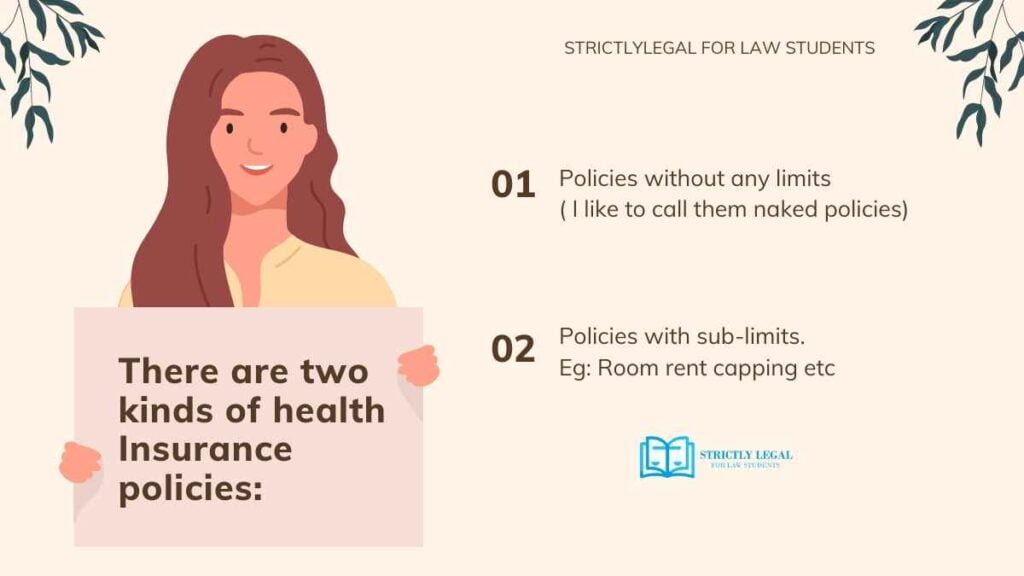I’m writing this blog so that people avoid buying the wrong health insurance. The Insurance market in India is a booming market worth billions of dollars and is projected to grow at least 50-60x from what it is today. This aggressive expansion is possible because it has an untapped market. A lot of people in India still do not have health insurance.
Insurance agents have a high motivation to sell you any kind of insurance because they have a direct commission on every sale. In all probability, they will sell you an insurance that they are associated with and which might not be the best fit for you.
This blog covers 5 key components you should keep in mind before you purchase your health insurance.
Sub-limits

There are two kinds of health Insurance policies:
1. Policies without any limits ( I like to call them naked policies)
2. Policies with sub-limits.
What is a sub-limit policy?
These policies restrict how much you can claim irrespective of the expenses incurred. Sub-limits could be in a way of hospital or nursing home room rent capping, doctor’s consultation fee, ambulance charges, even some surgical procedures such as cataracts, ligament reconstruction, etc.
I always recommend buying health insurance policies that have no sub-limits. Apart from certain circumstances, buying a health Insurance policy with sub-limits could be a “Financial Suicide”.
Room-rent Capping
Room rent capping or sub-limit of room rent could very well be misunderstood and misexplained by your insurance agent. A lot of times people think that room rent is the amount you pay for the expenses against your hospital room charges.
That could be true to a certain extent but the definition of room rent capping does not end there in the world of health insurance. All other expenses (mostly) for example doctor consulting charges, nurses, etc are also linked to room rent charges. Let me explain:
Suppose your Insurance policy limits your room rent to Rs. 5000 per day. And somehow, the hospital you’re admitted to charges Rs. 10,000 for the room. It does not mean that your insurance provider will allow a claim of Rs. 5000 and the rest will be borne from your pocket.
It means that all other expenses will be allowed in proportion to your room rent. So, now, you’re paying 50% of your hospital expenses instead of Rs. 5000. It’s a big difference.
The math has been simplified to explain.
Here’s what this looks like on your policy schedule:
“Expenses relating to hospitalization will be considered in proportion to the eligible room rent/room category
Clause from a health insurance contract
stated in the policy schedule or actuals whichever is less….”
Co-payment
In simple words, another financial suicide. I will never recommend anyone to buy health insurance policies that requires co-payment. Co-payment means that the insurer requires that the insured person shares the expenses on a pre-decided percentage for the claim.
For example: If your hospital bill is Rs. 10,000 a 20% co-payment will mean you will have to bear Rs. 2000. Also, keep in mind that almost all the insurance companies disallow certain expenses such as syringes, cotton, etc. Keep a 5-10% gap there which means a 20% co-payment policy will ultimately make you bear 25-30% of the expenses.
Network Hospitals
Before you purchase your health insurance make sure you have enquired about the network hospitals that the insurance company is associated with. Network hospitals are such hospitals that have an agreement or arrangement with the insurance company that enables them to provide cashless facilities.
In case of an emergency, there is a high chance that the patient will be taken to the nearest hospital which could be a network hospital or a non-network hospital. Admission to a non-network hospital will mean that you will have to pay the hospital bills from your own pocket up front and then later claim it via reimbursement.
But that is not all of it. Insurance companies will most of the time not allow 100% of that claim amount in case of reimbursement of a bill from a non-network facility because that particular facility does not follow their billing patterns.
so, What is the way out?
Make sure you pick an insurance provider that has the widest possible network of cashless facilities. But there’s a catch. Be very careful when you interpret those numbers. Some Insurance companies will claim that they have 11000+ network hospitals across India which is a good thing. But when you analyze those network hospitals you will have to ensure that the specific area that you reside in also has the maximum coverages.
The best way to do this is by visiting the official website and there should be an option to insert your area pin code and read the list of hospitals and nursing homes.
If you see 4 hospitals and 7 eye clinics. That could be a red sign.
Age of the Insured
Buying health insurance is like planning your bad days. The insurance policy that you should buy depends on the age of the insured. There could be two circumstances:
- When you consider the insured a normal healthy person
- When you consider the insured a high risk individual.
Let me explain hypothetically:
If I am a person aged 50+ and I smoke 1 packet of cigarettes every day or If I work at a paint factory which includes severe health hazards. I would fall under the second category of considering myself a high-risk individual. There’s a very good possibility that in the future I will need medical assistance in illnesses related to lungs, breathing, or stroke due to oxygen deficiency.
I will certainly consider buying a health insurance policy that necessarily covers these illnesses without any sub-limits.
One could argue that you cannot forecast your health problems, but as I said in all probability one can plan ahead.

Standard Exclusions
Every health insurance policy has some standard exclusions laid out in the policy schedule or policy wordings. Standard exclusions mean that the insurer will not allow claims that are related to the exclusions.
For example:
Expenses related to the treatment of a pre-existing Disease (PED) and its direct complications shall be excluded until the expiry of 48 months of continuous coverage after the date of inception of the first policy with insurer
Clause from a health insurance contract
The above clause of standard exclusion means that the policy will not cover any illness that the insured person may have before the purchase of the policy. It will only cover those illnesses after the expiry of 48 months i.e. after 4 years of continuous coverage.
Continuous coverage means that the policyholder has been paying a regular premium without any failure for the specified number of years.
Read: Can hospitals hold patients hostages for unpaid bills?
Frequently asked questions related to health insurance
Absolutely, accidents and illnesses don’t see age. The insurance premium you will pay is a ticket to your secure future. Anyway, health insurance for a person below 30 will have a very small amount of premium. Totally Worth it.
Clauses such as Room rent capping, sub-limits, coverage, and sum insured. Don’t forget to learn more about your standard exclusions.
The sum insured requirement will depend on your age, budget, and a few other factors. Irrespective of your age you should at least consider Rs. 3,00,000 as a sum insured without any sub-limits.
Not all insurance policies can be ported. Consult your agent to know more about orting your existing insurance policies.
Conclusion
That concludes this short guide on things you should know before buying health insurance. It was not possible to cover all of the clauses. Make sure you read the policy schedule or the policy wordings carefully before you purchase it. A health insurance policy is a very important ingredient in your lifestyle. Choosing the wrong policy can prove to be very expensive.

Passionate about using the law to make a difference in people’s lives. An Advocate by profession.





